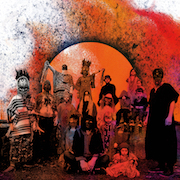Searching for hidden meaning in an album title that suggests some kind of farewell wouldn’t be too far removed from the behaviour of, say, a conspiracy theorist convinced that secret messages are contained within the grooves of a record. Of course, it doesn’t help that towards the end of this, Goat’s third album, is a track called ‘Goodbye’ – but, taken as whole, Requiem is an album that finds the mysterious Swedes exploring new territories of sound, groove and inspiration while consolidating the psyche-inflected music that has preceded it. Sadly, it doesn’t entirely work.
That Goat are keen to seek out new forms of expression is clear from Requiem‘s opening moments: this isn’t an album that explodes from the off, but one that grows slowly and methodically to introduce new ideas and platforms before moving into more familiar vibrations: this isn’t an album that explodes from the off, but one that grows slowly and methodically to introduce new ideas and platforms before moving into more familiar vibrations. And, given a running of almost an hour, Goat have sequenced the album in much the same way a DJ worth their salt will build their set — to create anticipation, tension and release.
‘Djorolen/Union Of Sun And Moon’ is a disconcerting introduction and the heavy use of pipes suggests that Goat have turned into some kind of charismatic happy-clappy cult. Indeed, the pipes dominate the first three numbers and there’s a fear that Goat have moved into somewhat childish dynamics, in favour of the heavier rhythmic interplay that has been their calling card. And yet, by the time they reach the repetitious and trance-like ‘Temple Rhythms’, it becomes evident that Goat are attempting to tease us as they adopt a tantric form of maintaining interest. Either that or they’re displaying a fondness for The Incredible String Band.
Goat’s inspirations have also broadened. As evidenced on ‘Trouble In The Streets’, they have turned to the indigenous music of South Africa in much the same way Malcolm McLaren and Paul Simon did back in the 80s. The trouble is that it all feels a little too forced, as if the band are making a conscious effort to move away from the music that made their name. It’s difficult to shake the feeling that, by adopting the character of a mysterious and masked cult, Goat have backed themselves into a cul-de-sac with little room to manoeuvre. It certainly goes some way to explain why the second half of the album works so much better than the first.
‘Goatband’ finds the band on more familiar territory and playing with a much firmer footing. Yet over the period of its seven-minute running time, you can’t help but realise that the band have turned to The Rolling Stones’ ‘Jumping Jack Flash’, looped the central riff and stretched it out into a hypnotic musical mantra. It’s easy to forgive this, though, as — unlike the first half of the album — this feels like Goat doing what they do best: locking into rhythms and grooves that feel like a natural extension of what’s come before it. Similarly, the equally drawn out ‘Goatfuzz’ really does what it says on the tin; Goat collide fuzzed-up psyche rock with circular polyrhythms to create dense and entrancing hypno-monotony that’s deliciously compelling.
Ultimately, Requiem is something of a mixed bag and you can’t blame a band as idiosyncratic as Goat for trying to break out. But Goat seem to be too consciously searching around for a new route forward rather than going with their instincts. For the first time, Goat feel unsure of what their purpose is and, by tentatively moving into other global regions to satisfy their muse, have lost a part of the charm that made them so attractive in the first place: not far beneath the surface, there’s a feeling that Requiem seems slight and uncertain when compared to its predecessors.


